2020人教版八年级英语上册unit1单元全套课件
2020秋人教版八年级上册英语全册完整课件
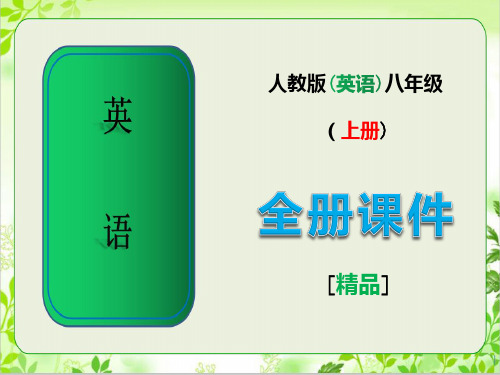
A: Where did … go on vacation? B: ...
went to the beach
A: Where did … go on vacation? B: ...
stayed at home
2a Listen. Where did the people go on vacation? Complete the chart.
anyone 任何人 each 每个
个
anything 任何 事物
no 无 nobody 无人
every 每个
nothing 无物 all 全体;全部 both 两个(都) none 没人或物 (指两个以上)
other(s) 另一个 (些) another 另外一 个;又一个 much 很多
many 很多
neither 没人或物
(指两个当中)
anybody 任 few 一些;几
Where did you go on vacation?
visited museums
Where did you go on vacation?
went to summer camp
1a Match the activities with the pictures [a-g].
Where did you go
do anything
✔
Julie interesting?
study for tests? ✔
go out with anyone?
✔
Talk about your vacation plans with your friends and fill in the chart.
Name Vacation plans Who? When?
人教新目标八年级上Unit1课件(共25张PPT)
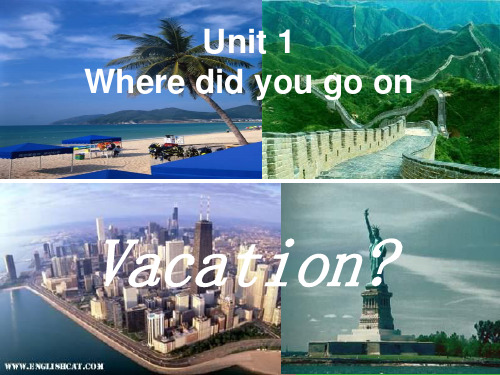
3a
Fill in the blanks with the words in the box and practice the conversation.
anything
anyone
everything
something anything anything
nothing
3b
everything
no one
vacation.
Yes, I bought _s_o_m__e_t_h_i_n_g__ (某物)
for my father.
__H__o_w__w__a_s_t_h_e__f_o_o_d_?____________
(食物怎么样呢?)
_E__v_e_r_y_t_h_in__g_t_a_s_t_e_d__re_a__ll_y_g__o_o_d_.__
(每样东西品尝起来都很好。)
_D__id__e_v_e_r_y_o_n__e_h_a__v_e_a__g_o_o_d__t_im__e_?_
( 每个人都玩得高兴吗?)
_O__h_,_y_e_s_._E__v_e_r_y_o_n_e__w_a__s_e_x_c_e_l_le_n__t.
(哦,是的。每样东西都很棒。)
Unit 1 Where did you go on
Vacation?
Teaching aims: 1.Master the new words and phrases. 2.Learn how to talk about the past events.
Where did you go on vacation?
Helen: Yes, I went to Guizhou with my
人教英语八年级上册 UNIT1 SectionB 1a-2e (共52张PPT)

第一人称 myself
第二人称 yourself
himself
第
三
herself
人
称
itself
ourselves
yourselves
themselves
复合不定代词:
some any every
no
人 someone anyone everyone no one
物 something anything everything nothing
It tasted great because she was hungry.
Complete the conversation about 2d Jane’s trip to Penang using the
information in the diary entries.
Anna: Hi, Jane. Where did you go on vacation last week?
Things Jane did Did she like Why or why not?
or saw
it? (Yes/No)
tried paragliding Yes
It was exciting.
ate Malaysian yellow noodles
walked around Georgetown
What they saw They saw many _n_e_w__a_n_d__o_ld__ buildings and the houses of the Chinese traders. Weather It was _s_u_n_n_y__a_n_d_h__o_t .
On Tuesday Who Jane and her father. What they did •They took _t_h_e__tr_a_i_n__ to the top of Penang Hill. •They only had one bowl of rice and some fish because Jane’s father didn’t bring enough money.
人教版新目标英语八年级上册UNIT1精品课件
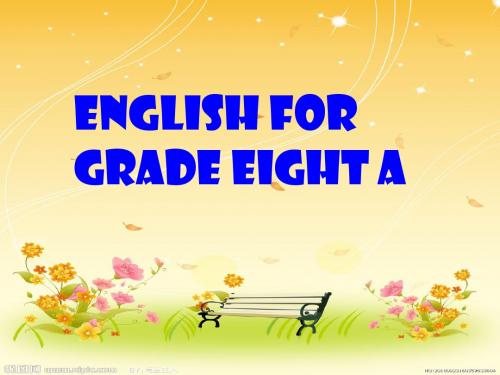
Class is over!
chocolate
milk
junk food
coffee
cola
chip
vegetable
fruit
1、But my mother wants me to drink it.
want to do sth. 想要做某事 want sb. to do sth. 想要某人干某事 Do you want to go to the movies with me? 你想和我一起去看电影吗? I want you to help me with my math. 我想要你帮我学数学。
11、次、次数 12、多久一次 13、至于、关于 14、踩滑板、参加滑板运动 15、没有的、全无的 16、几乎不、几乎没有 17、中学、公立中等学校 18、大多数的、大部分的 19、一次
time how often as for skateboard no hardly high school most once
3、sometimes
sometimes是频度副词,意为有时。和它一样是频度 副词的词还有哪些? CF:sometimes , some times , sometime , some time Sometimes:表示动作发生的不经常性,多用于现在或 过去的时态。 Sometimes:表示过去或将来的某个时间,是时间点, 对它进行提问要用when。 Some time:是名词短语,表示一段时间,是时间段。 Some times:意为几次,几倍。 对它提问用how many times.
3、散步是很好的运动。 (翻译)
1、喝,饮 2、习惯 3、必须 4、照顾,照看 5、采访者 6、虽然,即使,纵然 7、不同的,有区别的 8、或许,大概 9、分数,成绩 10、不健康的
最新人教版新目标英语八年级上册unit1课件.ppt资料讲解

reading.
Reporter: Oh, why is that?
Girl
3: Oh, I don't know. I guess
I just like books.
1c
The question:
What do you usually do on weekends ?
The answers:
e, 2
read
2b
Activities
a. go to the movies b. watch TV c. shop d. exercise e. read f.
How often
every day once a week twice a week three times a week once a month
times a week.
Reporter:How often do you shop? Cheng :Shop? I shop about ... about
twice a month.
2c
The question:
How often do you watch TV?
The answers:
Cheng :Oh, I read every day at
school!
Reporter:How often do you go to the
movies?
Cheng :Uhh ... let’s see ... maybe
once a month?
Reporter:How often do you exercise? Cheng :Oh,I exercise about three
2a
• once • twice • three times • four times
2020秋人教版八年级上册英语Unit 1 Section B (1a-1e) 教学课件

八年级英语上(RJ) 教学课件
Unit 1
Where did you go on vacation?
Section B (1a-1e)
学习目标
➢ Key words & phrases:
delicious,exciting,terrible, expensive,cheap, boring
➢To express likes and dislikes.
Lead in
Look at the pictures below. What do you think of them?
expensive
cheap
delicious
excientation
__Y_e_s_, _sh_e__d_id__. _______________________ 4. Did Lisa like her vacation?
__Y_e_s_, _sh_e__d_id__. _______________________
1d Listen again. Fill in the blanks.
2.Sentences: ①Where did Lisa go on vacation? ②Did she buy anything special? ③Did she buy anything for her best friend? ④Did Lisa like her vacation?
Homework
What did Lisa say about ...? her vacation _g_r_e_a_t__ the people _(r_e_a_l_ly_)_f_r_i_en__d_ly the fun park(_r_e_a_ll_y_)_e_x_c_it_in_g the food _d_e_li_c_io_u_s__ the stores _(_v_er_y_)__ex_p__en__si_v_e_
人教版八年级上册Unit1课件

The rules of the past form
2Hale Waihona Puke 1playedworked
wanted needed decided lived improved
4
carry- carried study- studied worry- worried stop- stopped shop- shopped plan- planned
People Grace Kevin Julie Places New York City the beach stayed at home
Listen again. Check ( ) Yes, I did or 2b No, I didn’t for each question.
Did you… go with anyone? Grace go to Central Park? buy anything special? Yes, I No, I didn’t. did.
1c
buy have a gift a good study play stay volleyball at for home a test time Did you Did he go +V. …? -Did you No, he didn’t. Did you buy Did he they study No, they Yes, II did. No, he didn’t. have a good out with Yes, did. -Yes, I did. He stayed at a for gift? play football? a test? didn’t. time? --anyone? No, I didn’t.. I home. V.-ed …
人教版八年级上Unit1PPT课件

06
口语表达与交际能力培养
口语表达技巧指导
语音语调
指导学生正确发音,练习升降调,使口语表达更自然流畅。
词汇运用
教授学生运用恰当的词汇描述事物、表达情感,提高表达 的准确性和生动性。
句式变化
引导学生使用不同的句式结构,如简单句、并列句、复合 句等,增强表达的多样性和逻辑性。
情景对话设计与角色扮演
小组讨论
组织学生进行小组讨论,围绕特定话题展开讨论,提高学生的参与度和
口语表达能力。
02
演讲比赛
定期举办演讲比赛,鼓励学生积极参与,锻炼学生的演讲技巧和公众表
达能力。
03
语言游戏
设计有趣的语言游戏,如绕口令、猜谜语等,让学生在游戏中提高口语
表达的流利度和准确性。
THANKS。
设计真实场景
模拟生活中的各种场景,如学校、家庭、商店等,让学生在真实环境中进行口语练习。
角色扮演
分配学生扮演不同角色,如教师、学生、家长、店员等,通过角色扮演练习口语表达和交际 能力。
对话示范与引导
提供对话示范,引导学生掌握对话的基本结构和表达方式,鼓励学生自由发挥,创新表达。
口语练习活动组织
01
5. Could you please tell me how _______ (get) to the post office?
语法练习题及答案解析
答案解析
1. goes。主语he是第三人称单数,所以谓语动词要用第三人称单数形式 goes。
2. play。情态动词can后面跟动词原形play。
语法练习题及答案解析
• 例句:It's important to arrive on time. 准时到达 很重要。
人教版八年级英语上册unit 1 课件
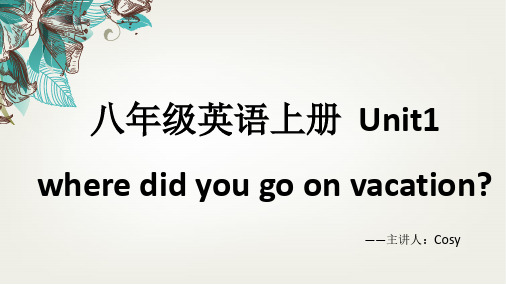
八年级英语上册 Unit1where did you go on vacation?——主讲人:Cosy1. anywhereanywhere是副词,意为“在任何地方”,常用在否定句或疑问句中,而在肯定句中,则多用somewhere。
例如:He can’t find his English book anywhere.他到处找不到他的英语书。
I think he must live somewhere.我觉得他肯定住在某个地方。
2. fewfew 意为“少数的;很少的”,只修饰可数名词,表否定含义。
例如:I can see few birds in the tree. 我几乎看不到树上有鸟。
a few 意为“几个;少许”相当于several,只修饰可数名词复数,表肯定含义。
例如: He has a few friends. 他有几个朋友。
3. most(1) most后可直接跟名词(可数或不可数),同时,也可接有形容词修饰的名词。
例如:Most boys like playing football. 大部分男孩都喜欢踢足球。
(2) most前有定冠词时,可用来修饰多音节形容词,表示最高级,意为“最”。
但是,如果most 前有不定冠词a,则表示“非常;很”,相当于very。
例如:This is the most beautiful flower. 这是最漂亮的花。
She is a most beautiful girl. 她是个非常漂亮的姑娘。
(3) most后不能直接跟有定冠词、指示代词或物主代词所修饰的名词,用most of代替most。
例如:I did most of that difficult work. 那件困难的工作绝大部分都是由我做的。
Most of the time we eat fish. 绝大部分时间我们都吃鱼肉。
4. boredbored也是形容词,意为“感到厌烦的”,一般用来说明人的感受。
英语人教版八年级上册课件Unit1.ppt

Singapore
Britain
Did you see Huangguoshu Waterfall? 黄果树瀑布
As the biggest waterfall in China and one
of the famous waterfalls in the world,
Huangguoshu Waterfall was watered from faraway rivers and brooks (小溪) and turns into swift torrent (奔流) at abrupt cliffs, thus creating a majestic grandeur (壮观) composed of torrential waves, water bloom and mist accompanied with roaring
People
Places
Grace New York City (Central Park) Kevin the beach Julie stayed at home
Байду номын сангаас
2b Listen again. Check (✔) Yes, I did or No, I didn’t for each question.
clean play visit study have go
cleaned played visited studied had went
stay
stayed
watch
watched
practice practiced
do
did
am / is was
1b Listen and number the people in the picture [1-5].
Unit 1 课件人教版八年级上册

time
place + description
feeling + reason
food + description.
How to write a diary?
Great works are performed not by strength but by perseverance
date : 星期,月 日 位于右上
Tian’anmen Square 天安门广场
The Summer Palace 颐和园
The Palace Museum 故宫博物馆
The Great Wall
Hutong
Beijing duck
Talk about
Imagine you are all foreigners on vacation in China. You Great works are performed not by strength but by perseverance meet each other at the airport on your way home. Talk about what you did on your vacation.
What is a diary ? Great works are performed not by strength but by perseverance
Beginning Body Ending
weather
Wednesday, August 20th
Today the weather was hot and sunny.I went to Tian'anmen. It
what where
人教新目标版八年级上册Unit 1 Period 1(共23张PPT)
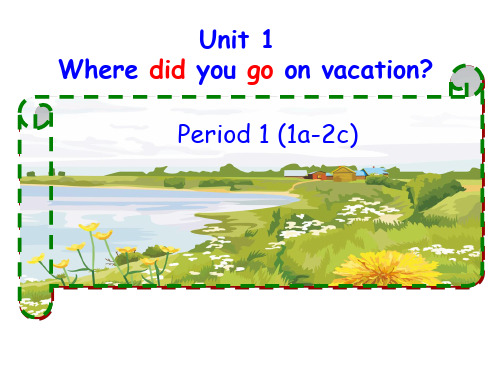
Period 1 (1a-2c)
Free talk
Did everyone have a great time during your summer vacations? What did you do ?
Did you go on vacation?
went to New York City
Guess
Where did they go on vacation?
went to the mountains
visited museums
Guess
Where did they go on vacation?
went to summer camp went to the farm
。2021年2月28日星期日2021/2/282021/2/282021/2/28
• 15、会当凌绝顶,一览众山小。2021年2月2021/2/282021/2/282021/2/282/28/2021
• 16、如果一个人不知道他要驶向哪头,那么任何风都不是顺风。2021/2/282021/2/28February 28, 2021
What did you do ? How was your vacation ?
It was great/wonderful .
s play a guessing game!
Where did I go on vacation ?
I went to Thailand with my friend.
•
THE END 17、一个人如果不到最高峰,他就没有片刻的安宁,他也就不会感到生命的恬静和光荣。2021/2/282021/2/282021/2/282021/2/28
2020人教版八年级英语Unit 1全单元课件

(7)以d结尾的词,把d变成t。 build→built,lend→lent,send→sent,spend→spent
PRACTISE
用动词的过去式填空
1. D__i_d__ you _r_e_m__e_m___b_e_r_(remember) to buy oranges? 2.Who __p_l_a_y__e_d_ (play) the computer games yesterday? 3.We __w__e_n_t__(go) to the cinema last night. The film _w_a__s_(be)
(2)以字母e结尾的规则动词,只加-d,如: love→loved;live→lived;arrive→arrived
(3)以辅音字母加y结尾的动词,变y为i,再加-ed,如: study→studied;cry→cried;worry→worried
(4)以重读闭音节结尾的 动词,末尾只有一个辅 音字母,先双写这个辅 音字母,再加-ed,如:
B. anywhere warm D. somewhere warm
3. few [fjuː] adj. 很少的 n. 少量
few 表示否定意义,作形容词时,意为“几乎没有”, 修饰可数名词复数。 【妙辨异同】few, little, a little的用法辨析
意为“很少,几乎没有”, 修饰可数名词复
Bob visited his uncle.
Tina went to the mo语中的动词按其过去式的构成方式可分为规则动词和 不规则动词。规则动词的过去式由词尾-ed构成,而不规则动词 的变化因词而异。 1. 规则动词过去式的构成及读音:
- 1、下载文档前请自行甄别文档内容的完整性,平台不提供额外的编辑、内容补充、找答案等附加服务。
- 2、"仅部分预览"的文档,不可在线预览部分如存在完整性等问题,可反馈申请退款(可完整预览的文档不适用该条件!)。
- 3、如文档侵犯您的权益,请联系客服反馈,我们会尽快为您处理(人工客服工作时间:9:00-18:30)。
Where did Xiang Hua go on vacation?
She went to New York City.
Where did he go on vacation?
He went to the beach.
动词过去式 went stayed visited did was had
And what do you think we saw?
Other people on vacation.
People on vacation.
People on vacation.
That’s the only thing we saw.
go sightseeing visit museums
I went to the Great Wall.
Where did he go on vacation?
He went to summer camp. /kæmp/
露营地, 阵营
Where did you go on vacation?
I went to Beijing City.
Where did they go on vacation?
go fishing
Vacation Activities
go to the mountains stay at home
go to the beach
go to summer camp
go h on vacation? Who did you go with? Did you have a good time?
由于是询问已发生的动作(过去的事情),所以助动词用 过去式did,其后的动词用原形。
► —Where did you go yesterday? 你昨天去了哪儿?
— I visited my friends. 我去拜访了朋友。
2. I stayed at home. 我待在家里。 1)stay可以作及物动词,也可以作不及物动词。 当它作不及物动词时就不能直接接宾语,其后接 相应的介词短语,表地点 或表状态。
人教版八年级英语上册单元全套课件
unit 1
Where did you go on vacation?
Section A 1a-1c
Section A 2a-2d Section A Grammar
Focus-3c
Section B 1a-1e
Section B 2a-2e Section B 3a-Self
e.g. stay in the office 继续任职 (掌权) stay awake 不睡 (醒着) stay in the army 留在部队中 stay at home 呆在家中
He visited his grandparents.
1a Match the activities with the pictures [a-g].
1. stayed at home __f___ 2. went to New York City _b__ 3. visited my uncle _g__
动词原形 go stay visit do is have
Language Points
1. — Where did you go on vacation? 你去哪儿度假了?
— I went to the mountains. 我去了山区。
这是一个特殊疑问句。由“特殊疑问词+助动词+主语 +动词原形+其他?” 构成。
They went to the mountains.
Where did they go on vacation?
They went to the beach.
Where did she go on vacation?
She stayed at home.
Where did he go on vacation?
4. went to summer camp __d__ 5. went to the mountains __c_ 6. went to the beach __a__ 7. visited museums _e__
1b Listen and number the people in the picture [1-5].
1. Tina 2. Xiang Hua 3. Sally 4. Bob 5. Tom
21
53 4
1c Make conversations about the people in the picture.
A: Where did Tina go on vacation? B: She went to the mountains.
Where did Bob go on vacation?
He visited his uncle.
Where did Tom go on vacation? He went to summer camp.
Where did Sally go on vacation?
She stayed at home.
Check
使用说明:点击对应课时,就会跳 转到相应章节内容,方便使用。
➢ Objectives
To learn the past simple tense.
To learn to talk about past events. To learn to enjoy different kinds of
Where did she go on vacation?
She visited the USA. She went to New York City.
Where did they go on vacation?
They went to the museum.
➢ Group work
Where did you go on vacation?
activities, to enjoy life.
➢ Warming-up
We went on a vacation, vacation, vacation.
We went on a vacation. And what do you think we saw?
On vacation
And what do you think we saw?
